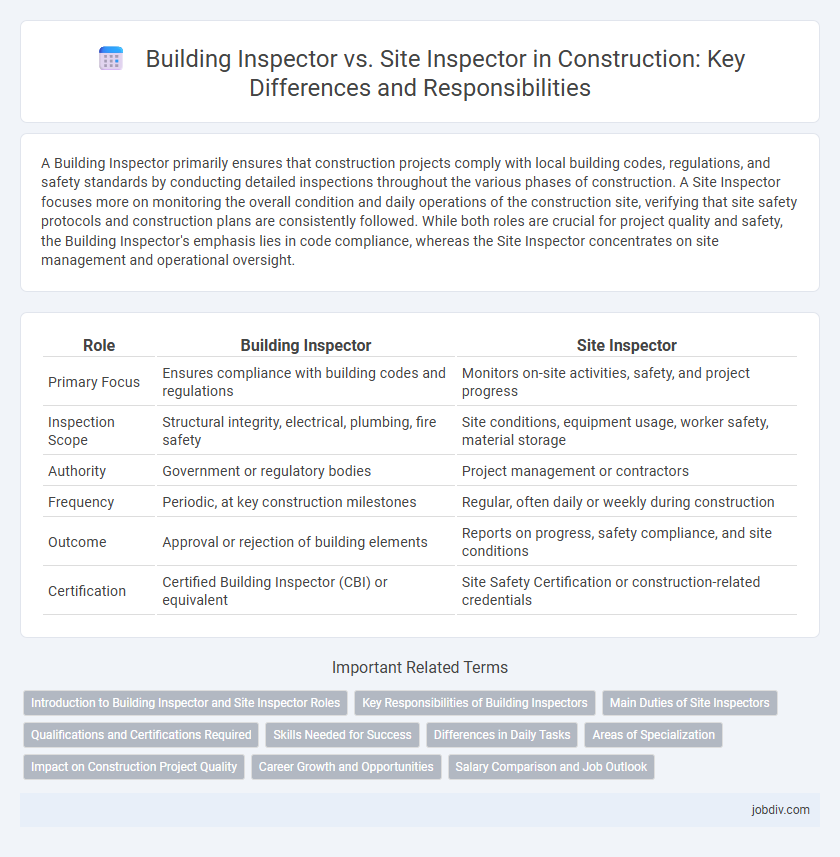A Building Inspector primarily ensures that construction projects comply with local building codes, regulations, and safety standards by conducting detailed inspections throughout the various phases of construction. A Site Inspector focuses more on monitoring the overall condition and daily operations of the construction site, verifying that site safety protocols and construction plans are consistently followed. While both roles are crucial for project quality and safety, the Building Inspector's emphasis lies in code compliance, whereas the Site Inspector concentrates on site management and operational oversight.
Table of Comparison
| Role | Building Inspector | Site Inspector |
|---|---|---|
| Primary Focus | Ensures compliance with building codes and regulations | Monitors on-site activities, safety, and project progress |
| Inspection Scope | Structural integrity, electrical, plumbing, fire safety | Site conditions, equipment usage, worker safety, material storage |
| Authority | Government or regulatory bodies | Project management or contractors |
| Frequency | Periodic, at key construction milestones | Regular, often daily or weekly during construction |
| Outcome | Approval or rejection of building elements | Reports on progress, safety compliance, and site conditions |
| Certification | Certified Building Inspector (CBI) or equivalent | Site Safety Certification or construction-related credentials |
Introduction to Building Inspector and Site Inspector Roles
Building inspectors assess the structural integrity, safety compliance, and adherence to building codes of construction projects from planning through completion. Site inspectors focus on on-site supervision, evaluating work progress, materials quality, and ensuring construction activities align with approved plans and safety regulations. Both roles are essential for maintaining construction standards and preventing costly errors or legal issues.
Key Responsibilities of Building Inspectors
Building Inspectors are responsible for ensuring construction projects comply with local building codes, safety regulations, and zoning laws by conducting detailed inspections at various stages of the build. They verify structural integrity, electrical systems, plumbing, and fire safety measures to guarantee the safety and quality standards of the building. Unlike Site Inspectors who focus more on project management and site conditions, Building Inspectors play a critical role in certifying that the final construction meets legal and regulatory requirements.
Main Duties of Site Inspectors
Site Inspectors primarily ensure compliance with safety regulations and construction standards on active building sites, conducting regular inspections to monitor progress and identify potential hazards. They verify that work aligns with approved plans and specifications while documenting and reporting any deviations or issues to project managers. Their role is critical in maintaining quality control and preventing delays by addressing problems promptly during the construction phase.
Qualifications and Certifications Required
A Building Inspector typically holds certifications such as ICC Certified Building Inspector or equivalent state licensure, requiring knowledge of building codes, safety standards, and structural integrity assessments. A Site Inspector often requires qualifications in construction technology or civil engineering and certifications like OSHA Safety Certification, emphasizing on-site safety compliance and project-specific inspections. Both roles demand comprehensive training and up-to-date certification to ensure adherence to legal and safety regulations in construction projects.
Skills Needed for Success
Building inspectors require strong knowledge of building codes, structural standards, and safety regulations to ensure compliance during construction and renovation projects. Site inspectors must possess keen observational skills, attention to detail, and expertise in site management practices to monitor ongoing work and enforce project specifications accurately. Both roles demand excellent communication abilities and problem-solving skills to effectively coordinate with contractors, developers, and regulatory bodies.
Differences in Daily Tasks
Building inspectors primarily evaluate structural integrity, code compliance, and safety standards of completed or nearly completed constructions, ensuring adherence to local regulations. Site inspectors focus on ongoing construction activities, monitoring daily workmanship, material quality, and equipment usage to prevent defects and delays. Both roles require detailed documentation, but building inspectors perform more formal assessments while site inspectors manage continuous workflow on-site.
Areas of Specialization
Building inspectors specialize in evaluating the structural integrity, safety compliance, and code adherence of constructed buildings, including electrical, plumbing, and fire safety systems. Site inspectors focus on monitoring construction site conditions, ensuring proper site preparation, environmental compliance, and adherence to project specifications throughout the building process. Each role requires expertise in distinct regulatory standards and practical inspection techniques tailored to different phases of construction.
Impact on Construction Project Quality
Building inspectors assess structural integrity, code compliance, and safety standards, ensuring buildings meet legal regulations and reducing risks of defects or failures. Site inspectors focus on on-site processes, monitoring workmanship, material quality, and adherence to project specifications to maintain construction standards. Their combined impact enhances overall construction project quality by identifying issues early and enforcing rigorous quality control protocols.
Career Growth and Opportunities
Building inspectors typically have broader career growth opportunities due to their responsibilities in ensuring compliance with building codes, zoning laws, and safety regulations across residential, commercial, and industrial projects, often advancing to roles such as senior inspectors, code enforcement officers, or construction managers. Site inspectors focus primarily on monitoring construction site activities, quality control, and safety compliance, which allows for progression into project management, safety coordination, or specialized inspection roles within construction firms. Both paths offer strong job stability and can lead to leadership positions, with building inspectors generally experiencing faster career advancement driven by their comprehensive regulatory expertise.
Salary Comparison and Job Outlook
Building inspectors earn an average salary of $60,000 annually, with potential growth driven by increasing construction regulations and safety standards. Site inspectors typically make around $55,000, benefiting from steady demand in construction project management and quality control. Job outlook for both roles remains strong, with building inspectors experiencing a 6% growth rate and site inspectors close behind at 5%, reflecting ongoing industry expansion and infrastructure development.
Building Inspector vs Site Inspector Infographic

 jobdiv.com
jobdiv.com